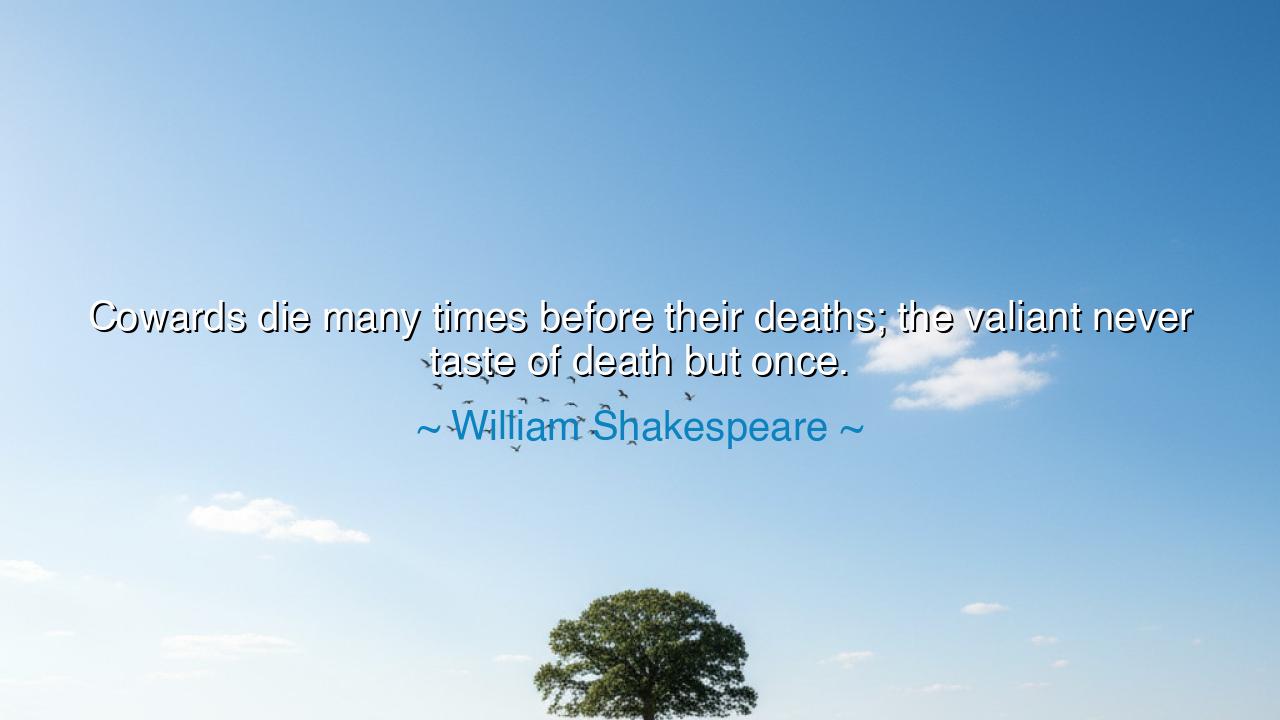
Cowards die many times before their deaths; the valiant never






“Cowards die many times before their deaths; the valiant never taste of death but once.” — William Shakespeare
These immortal words, spoken by Julius Caesar in Shakespeare’s great tragedy, are not merely the boast of a conqueror — they are the voice of eternal truth, echoing through the hearts of men and women across ages. When Caesar declares, “Cowards die many times before their deaths,” he names the secret terror that has chained humanity since the dawn of time: the fear of fear itself. For those who live in dread — of loss, of pain, of failure, of death — perish not once, but endlessly. Every moment they surrender to fear, a little light within them fades. Yet the valiant, those who face life with courage, taste death only once — at the appointed hour. Until that time, they live fully, freely, and unafraid.
Shakespeare, in his genius, drew this line not from invention but from observation of the soul. The coward’s death is spiritual, not physical. Each time a man turns away from his calling, each time a woman silences her truth, each time the heart retreats from love or justice — it dies a little. Such deaths are not marked by tombstones, but by the quiet erosion of the spirit. Yet the brave — those who dare to stand, to speak, to love, to risk — are alive in a way the timid can scarcely imagine. For courage is not the absence of fear, but the triumph over it.
The ancients knew this well. In the sands of Thermopylae, when Leonidas and his three hundred Spartans faced the endless armies of Persia, they knew death awaited them. Yet they stood without trembling, not because they thought they would live, but because they believed that honor outlives the body. Their courage turned mortal men into legend. They “tasted death but once,” and in that single act of valor, they became immortal in the memory of humankind. The coward hides to prolong his days; the brave steps forward and transcends time itself.
This truth is not confined to the battlefield. In the quiet wars of ordinary life — in the struggles of conscience, love, or duty — the same law applies. The coward dies whenever he bows to fear: when he chooses silence over truth, comfort over justice, pride over love. The valiant, however, live fully even amidst pain, because they refuse to betray the deepest part of themselves. Consider Rosa Parks, who, by a simple act of courage on a bus in Montgomery, defied oppression and changed the course of history. Her body trembled, yet her spirit did not. In that moment, she conquered the death of fear, and the life of freedom was born anew.
When Shakespeare wrote these lines, he placed them upon the lips of Caesar, who saw himself as destined, unafraid of fate. Yet the wisdom extends beyond pride — it speaks to every soul that seeks peace. For the one who lives in fear is never at peace; he walks in the shadow of his own undoing. The valiant man, by contrast, makes peace with the inevitability of death — and therefore, nothing can enslave him. To conquer fear is to conquer all things.
The message, though ancient, remains urgent. Every age breeds new forms of cowardice — the fear of failure, the fear of rejection, the fear of standing alone in truth. Yet every age also calls for courage. The world moves forward not by the timorous, but by the bold: the ones who dare to live as if every breath were sacred, every choice eternal. The valiant are not immune to fear, but they look upon it and say, “You may visit me once, but you will not rule me every day of my life.”
Lesson:
Let Shakespeare’s wisdom be carved upon the heart: do not die a thousand small deaths before the one that must come. Do not let fear rob you of the glory of living. When challenges rise, stand firm; when truth calls, answer it; when love demands vulnerability, offer it freely. The coward dies each time he turns away from life, but the brave — the valiant — die but once, and their spirits live forever. Therefore, live so that death may find you not trembling, but radiant — alive to the last breath, and unafraid.






AAdministratorAdministrator
Welcome, honored guests. Please leave a comment, we will respond soon